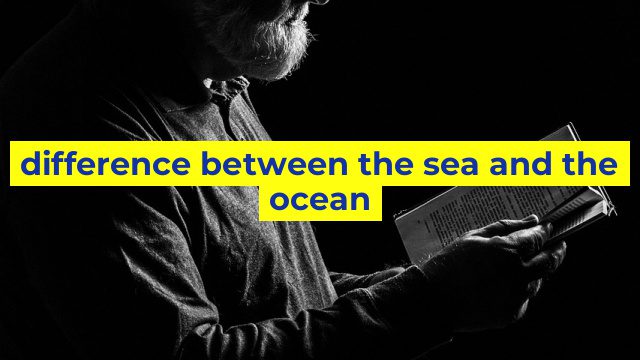The Difference Between the Sea and the Ocean
Introduction
When we think of the vast expanse of water that surrounds our planet, we often use the terms “ocean” and “sea” interchangeably. However, there are important differences between these two bodies of water that are worth exploring.
What is an Ocean?
An ocean is a vast body of saltwater that covers nearly three-quarters of the Earth’s surface. There are five recognized oceans on our planet: the Atlantic, Pacific, Indian, Southern (also known as the Antarctic), and Arctic oceans. Oceans are characterized by their vast size, deep waters, and strong currents. They are also home to a wide variety of marine life, from tiny plankton to massive whales.
What is a Sea?
A sea, on the other hand, is a smaller body of saltwater that is partially enclosed by land. Seas are usually connected to larger bodies of water, such as oceans, and are often shallower than oceans. They are also more affected by weather events such as storms and are subject to tides. Some well-known seas include the Mediterranean Sea, the Red Sea, and the Caribbean Sea.
The Key Differences Between Oceans and Seas
While oceans and seas are both bodies of water, there are several key differences between them. Here are some of the most significant:
Size: Oceans are much larger than seas. For example, the Pacific Ocean is more than 60 times larger than the Mediterranean Sea.
Depth: Oceans are deeper than seas. The average depth of the world’s oceans is over 12,000 feet, whereas the average depth of seas is only around 650 feet.
Currents: Oceans have strong currents that circulate large amounts of water around the planet. Seas have weaker currents that are more influenced by local weather patterns.
Salinity: Oceans are saltier than seas, with an average salinity of 3.5%, while seas have an average salinity of around 3%.
Conclusion
In conclusion, while both oceans and seas are bodies of saltwater, they have important differences in size, depth, currents, and salinity. Studying these differences can help us better understand the unique features of each body of water and their vital role in our planet’s ecosystem.
Table difference between the sea and the ocean
| Type of Water Body | Differences |
|---|---|
| Sea | Generally smaller in size than oceans |
| Can be found near or far from land depending on the location | |
| Usually saltwater but can also be brackish or freshwater | |
| Has a comparatively simpler ecosystem than oceans | |
| Ocean | The largest bodies of water on Earth |
| Always connected to other oceans | |
| Completely saltwater | |
| Has a much more diverse and complex ecosystem than seas |
